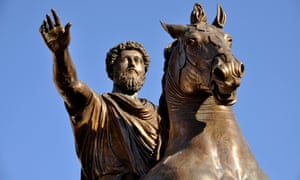From The Guardian : Lessons in Stoicism review – what ancient philosophers teach us about how to live
Lessons in Stoicism review – what ancient philosophers teach us about how to live
John Sellars on why the Stoics’ ideas are so popular today – is it self-help, or a lurking machismo?
On 9 September 1965, during the war between Vietnam and the US, James Stockdale, an American fighter pilot, inadvertently flew his small A-4 Skyhawk into a flak trap. He later recalled his thoughts as he ejected and contemplated his impending capture: “Five years down there, at least. I’m leaving the world of technology and entering the world of Epictetus.” We all react differently, and unpredictably, in moments of great peril: in this case Stockdale was drawn back to an inspirational philosophy class he had taken three years earlier, and to a period when he was obsessively reading a relatively little-known ancient Greek philosopher.
Epictetus himself was a former slave who taught Stoic philosophy in the late first and early second centuries, first in Rome and then in northern Greece. Along with the Roman writers Seneca and (the emperor) Marcus Aurelius, he left us the longest surviving treatises on Stoicism, an ancient Greek philosophical doctrine that originated in the third century BCE. The Stoics (who originally gathered in the stoa or colonnade in the Athenian agora) offered a comprehensive theory of existence, covering physics, language, psychology, theology, sense perception and much more; but the doctrine was at its base an art of good living. We should concern ourselves only with what we can control (what is eph’hēmin, “up to us”), and leave the rest; we must pursue only things of real value such as enhancing collective happiness, not “things of indifference” such as wealth and the respect of our peers; we must allow ourselves to be guided by reason, and not dominated by the passions, which lessen our self-control. These were the lessons that Stockdale repeated to himself through what turned out to be seven and a half years of often brutal captivity. “You may fetter my leg,” Epictetus had written, “but not even Zeus himself can overpower my will.”
In turning to Stoicism, Stockdale was ahead of his time. Particularly over the last 15 years, interest in it has surged, with articles, blogs, journals and groups springing up everywhere. Even Steve Bannon and the alt-right have been getting in on the act — although, as Donna Zuckerberg has shown, engagement on the part of this particular community can be pretty superficial, and members are in reality more likely to be found reading memes than Marcus Aurelius’s Meditations.
John Sellars is one of the founders of Modern Stoicism, a group that promotes Stoicism as a constructive response to contemporary life: among their activities is Stoic Week, in which those signed up are encouraged to apply Stoic principles to their life-choices for seven days. Lessons in Stoicism represents his attempt to distil key Stoic tenets, insofar as they can help contemporary readers, into under 100 small pages.
Sellars achieves the task he sets himself admirably. In elegant, economical prose, he urges us to become better, happier people by focusing on rational decision-making. This is Stoicism not in its popularised sense (the grin-and-bear-it ideology of Victorian public schools) but as self-empowerment through reasoned deliberation. Once you have learned to clarify which choices are available to you, and what their likely consequences will be, you will be better equipped to deal both with trials of adversity and the temptations of success.
Certainly, translating ancient philosophical texts into guiding principles for modern living can lead to simplification and distortion. Ancient Stoicism was much more broad-ranging, complex, and indeed weird, than Sellars lets on. You won’t read anything here about the theory of language based on cognitive impressions or the idea that the universe goes through periodic cycles of conflagration and renewal. Sellars skirts the Stoics’ belief in a designer deity, arguing that ‘God’ is simply a way of thinking about nature and the animate interconnectedness of the universe (and comparing James Lovelock’s Gaia hypothesis). But this underplays the role of providence: ancient Stoics and Stoic-influenced writers often speak about their god as supremely rational and ordering the events of the world for the best. Philosophers both ancient and modern have struggled with this tendency in Stoicism towards determinism, and the question of where it leaves individual agency.
Just occasionally, we get a glimpse of fundamental incompatibilities between ancient Greco-Roman and modern liberal values – particularly in the areas of sex and gender. For example, the Roman Stoic Musonius Rufus is saluted for his argument that women can practise philosophy just as well as men, and thereby proposing “some form of gender equality”. But Sellars doesn’t give us the full story. What Musonius actually thought was that women and men are differently equipped by nature. Learning philosophy does not make women equal to men; it just makes them better at the tasks to which they’re suited (spinning, weaving, childrearing). Some of Sellars’s paraphrases of ancient ideas, moreover, may accurately reflect ancient beliefs, but sit rather awkwardly in a 21st-century ethical context: for example, “none of us has chosen our … gender”; “a healthy relationship is one based on natural desires for companionship and procreation”.
But what is striking is not that ancient and modern thought sometimes misalign: it’s that, in spite of that misalignment, Stoicism retains so much appeal for modern readers. The reasons for this popularity are several. There is certainly an extent to which Stoicism responds to modern “self-help” culture. There is also a kind of lurking machismo to its heroisation of endurance and suffering. Most of all, however, it is that maligned, embattled, but nonetheless tenacious idea of rationality that keeps drawing the readers. Few today would agree that reason alone could ever be sovereign in human decision-making, to the exclusion of emotions, group dynamics, the unconscious, the body, and instincts honed by evolutionary adaptation. But it is reason alone that can help us change, develop and take control of our lives; and the Stoic message that we must do all we can to nurture this powerful but brittle gift is timeless and ever-necessary.
• Lessons in Stoicism: What Ancient Philosophers Teach Us about How to Live is published by Allen Lane (RRP £9.99) . To order a copy go to guardianbookshop.com or call 0330 333 6846. Free UK p&p over £15, online orders only. Phone orders min p&p of £1.99.


Comments
Post a Comment